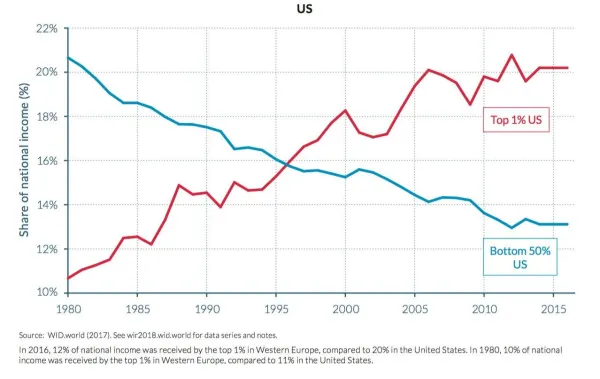A Decade Later: Four Ways Working People Are Still Paying for the 2008 Financial Crisis

It was 10 years ago this month that the 2008 financial crisis kicked into high gear. When storied Wall Street bank Lehman Brothers shut down, bankers walking out of the building carrying cardboard boxes of their possessions made the perfect image for TV cameras.
But the real story wasn’t happening on Wall Street. It was in the homes of working people all across the country where the crisis had a real impact. Bad loans fueled plummeting house prices and massive numbers of foreclosures and evictions.
Ten years later, with no one prosecuted for the damage done to millions of families, many of those families are still rebuilding their lives. While big banks and billionaires pay off politicians to dismantle the regulations put in place to prevent another crisis, the deck is still stacked against working families. Here are a few ways our economy doesn’t work for us:
1. Attacks on Unions
From the U.S. Supreme Court’s ruling in Janus v. AFSCME to bills introduced in state capitals across the country, billionaires and corporate special interests are funding constant attacks on workers’ rights to stand together in strong unions. The result? Lower wages and fewer benefits for working families, and more power in the hands of people who rig the system against them.
2. Income Inequality
Studies show the rise of inequality is directly linked to attacks on unions. The disparity between the wealthiest Americans and the rest of us continues to grow. While the income of the top 1 percent has grown constantly, the bottom half of Americans have seen their income drop in the same time.

In the U.S., while the income share of the richest 10% has continuously risen since the 1980's, the share owned by the bottom 50% of the population dropped. (Source: World Inequality Database)
3. Wages Falling Behind the Cost of Living
The federal minimum wage has been stuck at $7.25 per hour since 2009. But the bottom of the scale is just part of the story. As corporate CEO salaries skyrocket ever higher, working families are barely making ends meet as health care costs, college tuition and other costs of living continue to rise.
4. Big Tax Cuts for the Rich
When the White House and its allies passed a big tax cut earlier this year, they promised that the benefits would trickle down to working families. But the promised benefits haven’t materialized. The vast majority of the cuts go to the very wealthy, and instead of creating jobs, big corporations have spent their tax-cut windfalls on stock buybacks.
It’s not all gloomy. There is a way to beat the forces that are bent on keeping working people down. And that is for workers to join together in a union, strengthen their voice and amplify the singular note of dissent – “no!”
Building power through unions remains the best way to make sure corporations pay their fair share of the price of progress, the best way to fix an economy that’s rigged for the billionaires and corporate special interests, and the best way to ensure that our economy provides working people with a fair return for our work and good benefits.
Luckily, this message is catching on, even at a time of unprecedented attacks on labor. Approval of labor unions hit a 15-year highrecently, according to a Gallup survey. Voters in Missouri soundly rejected a proposal to make the entire state “right to work.” States that adopted anti-worker right-to-work policies (think Wisconsin) are doing far worse than states (like Minnesota) where working people elected a governor who supports union rights.
Americans are recognizing the value of worker unions all over again. And that will do a country good.
